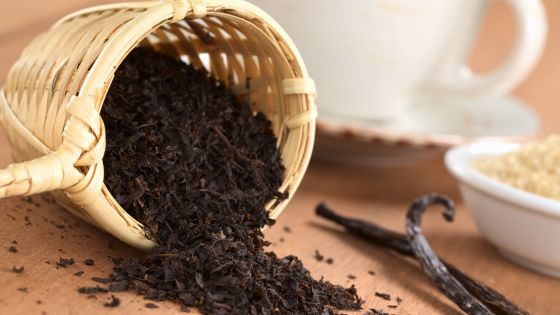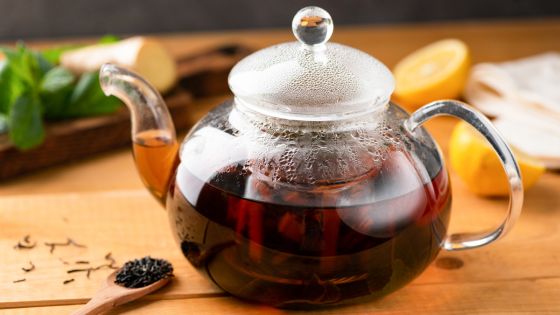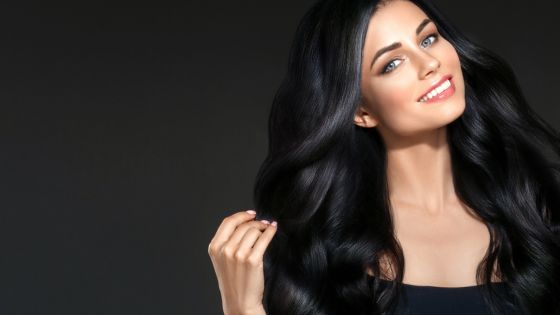Is Black Tea Rinse Good For Hair?
Hair care has been integral to human grooming practices for centuries, and various natural remedies have been used to promote healthy and lustrous locks. One such remedy that has stood the test is using tea rinses for hair health. Among the numerous types of tea, black tea has gained popularity as a potential elixir for hair care.
Dating back to ancient times, people from diverse cultures, including China, India, and Japan, have recognized the benefits of tea rinses for their hair. These cultures have harnessed the power of black tea as a beverage and a natural tonic for promoting hair growth, adding shine, and improving overall hair health.
With a resurgence in interest in traditional remedies, black tea rinse has recently captured the attention of hair care enthusiasts and experts alike. But does this age-old practice truly live up to its reputation? In this blog post, we delve into the potential benefits of using black tea as a hair rinse.
So, if you’re curious about incorporating natural remedies into your hair care routine or intrigued by the idea of black tea’s potential benefits for your tresses, keep reading to learn more about this ancient practice.
Is Black Tea Rinse Good For Hair?

Black tea rinse has gained popularity as a natural remedy for hair care, and many people swear by its benefits. But is black tea rinse good for hair? Let’s explore the potential advantages and scientific evidence to determine if black tea rinse can indeed be beneficial for your hair:
Stimulating Hair Growth:
Black tea contains caffeine, which has been linked to promoting hair growth. Caffeine can help block the effects of dihydrotestosterone (DHT), a hormone associated with hair loss. Additionally, the improved blood circulation resulting from applying black tea rinse to the scalp may nourish hair follicles, potentially supporting hair growth.
Strengthening Hair Follicles:
Black tea is rich in antioxidants, particularly polyphenols and catechins. These antioxidants can help protect the hair from damage caused by free radicals and oxidative stress, thus strengthening the hair follicles and reducing hair breakage.
Managing Scalp Conditions:
The tannins in black tea have astringent properties, which can help soothe the scalp and reducing irritation. Black tea rinse may be particularly beneficial for individuals dealing with dandruff or dry scalp issues.
Adding Shine and Luster to Hair:
The tannins in black tea also play a role in smoothing the hair cuticles, leading to shinier and healthier-looking hair.
While these potential benefits sound promising, it’s essential to acknowledge that individual results may vary. The effectiveness of black tea rinse for hair care can depend on factors such as hair type, scalp condition, and overall hair health.
Scientific research on the specific effects of black tea rinse on hair is still limited, and more studies are needed to understand its impact fully. However, the existing evidence and historical use of tea rinses for hair care suggest that black tea rinse could be a valuable addition to a natural hair care routine.
To incorporate black tea rinse into your hair care regimen, prepare a simple DIY rinse by steeping black tea in hot water, allowing it to cool, and then using it as a final rinse after shampooing and conditioning your hair. Some individuals also mix black tea with other natural ingredients, such as essential oils or apple cider vinegar, to enhance its benefits.
What is a black tea rinse?
A black tea rinse is a hair care technique that uses a solution made from steeped black tea to rinse the hair after shampooing. Black tea, derived from the Camellia sinensis plant, is a popular beverage known for its robust flavor and numerous health benefits. However, it also offers several advantages when applied topically to the hair and scalp.
B. The composition of black tea and its potential effects on hair.
Antioxidants: Black tea is rich in antioxidants, particularly polyphenols and catechins. These antioxidants can help neutralize harmful free radicals that contribute to hair damage, thus promoting healthier hair.
Caffeine: Black tea contains caffeine, which has been linked to stimulating hair growth. Caffeine can counter the effects of dihydrotestosterone (DHT), a hormone associated with hair loss.
Tannins: Black tea contains tannins, natural compounds with astringent properties. Tannins can help tighten the hair cuticles, leading to smoother, shinier hair and reducing frizz.
Vitamins and Minerals: Black tea contains essential vitamins like vitamin B, C, and E, along with minerals like potassium and manganese, which can nourish and strengthen the hair.
How to prepare and apply a black tea rinse effectively?

- Ingredients:
- 2 to 3 tablespoons of loose black tea leaves or 2 to 3 black tea bags
- 2 cups of water
- Steeping:
- Boil the water and pour it over the black tea leaves or tea bags in a heatproof container.
- Let the tea steep for 15 to 20 minutes, allowing the water to extract the beneficial compounds from the tea leaves.
- Cooling and Straining:
- After steeping, allow the tea to cool to room temperature. You can speed up the cooling process by placing it in the refrigerator for a few minutes.
- Once cooled, strain the liquid to remove any tea leaves or residue.
- Application:
- Wash your hair as usual with a gentle shampoo and rinse it thoroughly.
- Pour the black tea rinse over your hair to saturate the scalp and hair strands thoroughly.
- Gently massage the rinse into your scalp for a couple of minutes to enhance blood circulation and ensure even distribution.
- Let the black tea rinse sit on your hair for 5 to 10 minutes, allowing the beneficial components to penetrate the hair shaft and scalp.
- To remove the black tea solution, wash your hair thoroughly with cool or lukewarm water. There is no need to follow with conditioner, as the black tea rinse can act as a natural hair conditioner.
It’s important to note that black tea rinse can cause a subtle tint on light-colored hair over time. If you have light hair and are concerned about the potential tinting effect, you can perform a patch test before applying the rinse all over your hair.
By following these simple steps, you can effectively incorporate black tea rinse into your hair care routine and potentially experience its beneficial effects on your hair and scalp health. Remember to be consistent with its application to observe any significant changes in your hair’s texture and appearance. As with any new hair care practice, individual results may vary, so it’s always a good idea to try it and see how it works for you.
How often can you do a black tea hair rinse?
The frequency of black tea hair rinses depends on individual hair type, hair concerns, and how your hair responds to the treatment. As a general guideline, you can start with a once-a-week application and then adjust based on your hair’s needs and preferences. Here are some factors to consider when determining how often to do a black tea hair rinse:
- Hair Type: Different hair types have varying levels of porosity and oiliness. If you have oily hair, you may find that more frequent rinses are suitable for controlling excess oil and maintaining a fresh scalp. On the other hand, if you have dry or damaged hair, using the black tea rinse less often may be beneficial to prevent over-drying.
- Hair Concerns: Consider the specific hair issues you’re trying to address with the black tea rinse. A more regular application (e.g., two to three times a week) might be beneficial if you’re primarily using it to promote hair growth or combat hair loss. If you’re using it for general hair health and shine, once a week or every other week may be sufficient.
- Hair Response: Pay attention to how your hair responds to the black tea rinse. Some individuals may experience positive results with frequent use, while others might find that occasional application works better for them. If you notice any adverse effects like dryness or scalp irritation, reduce the frequency or discontinue use.
- Tinting Effect: Remember that with repeated use, black tea rinse can gradually impart a subtle tint to light-colored hair. If you’re concerned about this, use the rinse less frequently or perform a patch test before applying it all over your hair.
ALSO READ: Do Hair Darkening Shampoo Bars Work?
In summary, there is no one-size-fits-all answer to how often you should do a black tea hair rinse. It’s best to start with a once-a-week application and monitor how your hair responds. From there, you can adjust the frequency based on your hair’s needs and your desired results. If you’re uncertain about the ideal frequency or have specific concerns, consider consulting a hair care professional who can provide personalized recommendations for your hair type and condition.
Does tea rinse help hair growth?
Tea rinses are often recommended for hair health due to certain compounds in tea that can benefit the hair and scalp. Here are some potential benefits of tea rinses for hair:
- Strengthening and Reducing Breakage: Black tea contains tannins, a polyphenol type. Tannins can bind to the protein in the hair, helping to strengthen it and reduce breakage. Stronger hair is less likely to split or break, allowing it to grow longer without as much damage.
- Adding Shine: The tannins in tea can also smooth the hair cuticles, leading to shinier and more lustrous hair. This smoothness reflects light better, making the hair appear healthier and more vibrant.
- Scalp Health: Tea rinses may benefit the scalp as well. Black tea has natural astringent properties that can help to cleanse the scalp by removing excess oil and buildup. A healthier scalp environment is conducive to better hair growth.
- Antioxidant Effects: Tea, especially green tea, contains antioxidants that may help protect the hair and scalp from damage caused by free radicals. This protection can be beneficial for overall hair health.
However, it’s essential to note that while tea rinses can improve the condition of the hair and scalp, there is limited scientific evidence to support the claim that they stimulate hair growth directly. Hair growth is a complex process influenced by various factors, such as genetics, hormonal balance, diet, and overall health.
To promote hair growth, focusing on maintaining a healthy lifestyle, eating a balanced diet, managing stress, and using proper hair care practices is essential. While tea rinses can be a part of a holistic hair care routine, they are not a magical solution for hair growth and should be used with other healthy practices. If you have specific concerns about hair growth, it’s best to consult with a dermatologist or trichologist for personalized advice.
Does black tea rinse darken hair?

Yes, black tea rinse can darken hair, particularly if it is used regularly over time. Black tea contains natural pigments, primarily tannins, which can impart a subtle tint or color to the hair, especially for those with lighter hair shades. This tinting effect is more noticeable in light blonde or light brown hair.
The extent of darkening will vary depending on factors such as the natural color of the hair, the porosity of the hair strands, and the frequency of black tea rinse application. The more porous the hair, the more likely it is to absorb the pigments from the black tea, resulting in a more noticeable darkening effect.
It’s essential to perform a patch test before using black tea rinse all over your hair, especially if you have light-colored or chemically-treated hair. This will allow you to observe how your hair responds to the rinse and whether the darkening effect is desirable for your specific hair color.
If you’re looking to avoid darkening your hair but still want to benefit from the other potential advantages of black tea rinse, you can consider the following options:
- Reduced Frequency: Limit the frequency of black tea rinse application. Using it less often, such as once a month, may minimize the darkening effect while offering some rinse benefits.
- Dilution: Dilute the black tea rinse with water to reduce the concentration of pigments. This can help lessen the intensity of the darkening effect.
- Rinse Duration: Limit the time the black tea rinse stays on your hair during application. A shorter application time may result in a milder darkening effect.
- Hair Type: If you have dark hair, the darkening effect of black tea rinse may not be as noticeable or a concern.
In conclusion, black tea rinse can darken hair, especially light-colored hair, due to the natural pigments in black tea. If you have light hair and want to avoid darkening, consider using the rinse sparingly and performing a patch test beforehand to gauge its impact on your hair color. Remember that individual hair responses can vary, so it’s always best to experiment and find what works best for you.